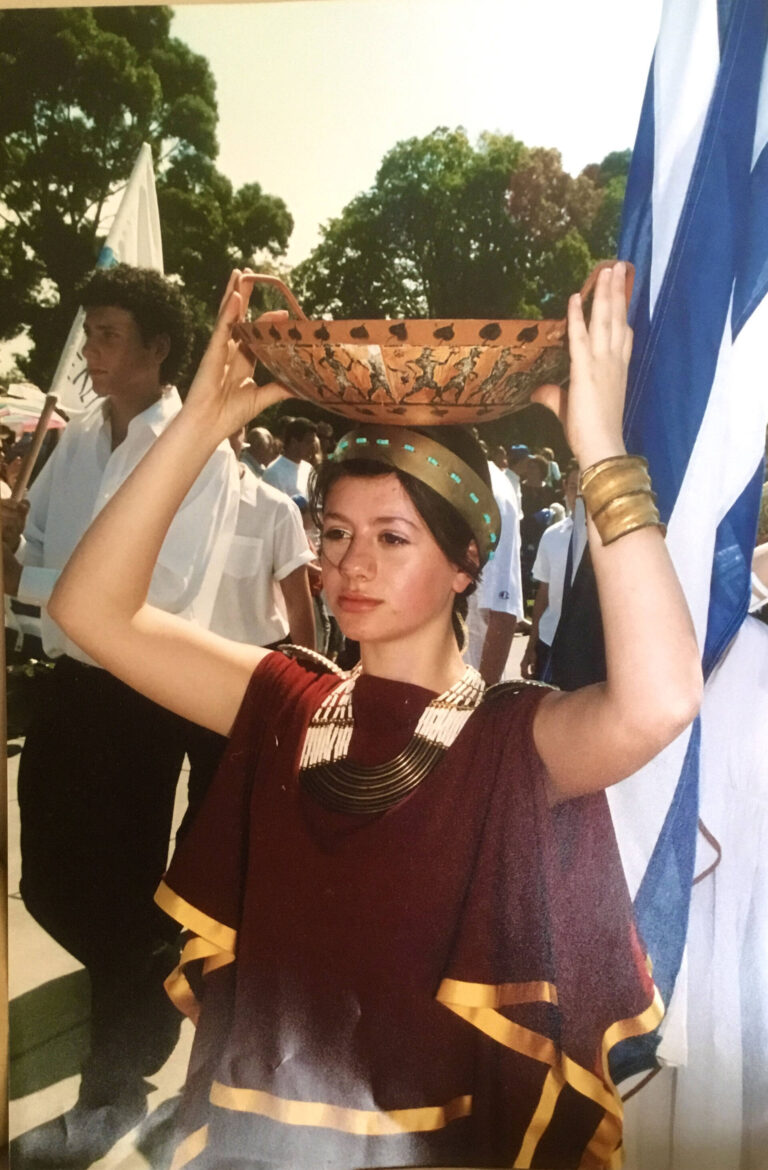Anatolia Karteras is in the UK for a study-teaching stint while planning her Greek island workshop on mythology and self-transformation. Seven years ago, one could not see this coming.
Working as a communications advisor for the education department, Karteras was on a career path she started planning since her university years but no longer felt aligned with.
“I studied a Bachelor of Arts at Melbourne Uni and then a Master of Commerce because I thought, a Bachelor of Arts wasn’t going to get me a job.
“My focus was on project management and at one point I also went to China because I was planning to apply for a diplomatic position” she tells Neos Kosmos.

Both her parents are first generation migrants, and she describes being raised with the ideal of professional security.
“My mum was from Kozani, came to Australia when she was nine. My dad is a passionate Greek man who just loves Greece but doesn’t want to live there. Everything was about safety because they didn’t have that sense of safety.
“So, I had all these grand ideas about needing security, needing a good job.”
She was on the ‘good job’ for four years when the realisation she “didn’t fit into it” materialised in quitting and pursuing an uncertain dream instead.

Karteras says her parents would said ‘Can’t you just stay in the job and then also do all the other little things on the side?’
Which she understood, “I really feel for them because they still think I should have stayed even though I’m happy and love what I do.
At 27 she left her government job and has since committed herself to “spiritual development and used mythology as a way to keep growing myself and my understanding of the world”.
Karteras found her calling in storytelling and psychology, running workshops and retreats focused on mythology and folk tales to help participants make sense of their own life stories.

“Using myth as a catalyst to then get people to explore their own inner realm and learn from that and grow from the myth and the characters […] There’s something about stories and symbolism. The psychology of the human is mirrored in mythology,” Karteras says.
She points to the example of the Greek myth of Erysichthon, king of Thessaly, who cut down a tree in the sacred grove of goddess Demeter, and for that he was cursed, forever suffering from hunger and thirst no matter what he consumed.
“Because he had consumed so much from the outside world, he was forced to consume himself. For me, that is an allegory for humanity right now.
“We are consuming so much that we’re actually being consumed ourselves and I don’t even think we realise it.”
Karteras says her flair for storytelling was kindled during her Greek school years.
“I have fond memories from studying in Nestoras in the 1990s under my dear teachers kyrio kai kyria Karanikolopoulos.
“When we learned myths at school, I was in awe.
“Stories and myths were alive me – my parents would relay Greek myths, and I remember watching Hercules and Xena on TV, like the ᾽daggy᾽ 1990s versions.”
Karteras was always an “avid reader and performer”.
“I could very easily shift into different characters.”

One of Kartera’s favourite myths is at the center of a storytelling retreat she will hold this coming Greek summer on Samothraki, the country’s northernmost island known for its unexploited nature.
Named ‘Katavasis'(descent), the event on Greek underworld myths pays tribute to the story of Persephone’s abduction by Hades and descent to the underworld.
Persephone became the queen of the underworld, and the myth came to symbolise the life-death-rebirth cycle through the changing seasons, as honoured at the Eleusinian rituals in ancient Greece.
Karteras believes it is a myth resonating with most, given the lessons the allegory holds for the “descent of growing into maturity”.

“I think many of us, we want to stay on the surface […] but from a personal development perspective, we need to go deeper and face the dark parts of ourselves.”
Growing up as a Greek Australian, Karteras says she strived for a sense of belonging.
“In Greece they saw me as the Afstraleza and in Australia I was the woggy Greek kid. So, I was this sort of in between person.”
Greek mythology she says, has empowered her to reclaim her identity, and wants to help others who have been in the same position.
“I know that many young people in Australia begrudgingly submit to our Greek traditions but don’t dig deeper into the power of our Greek mythology.
“Not as stories that have been co-opted and diminished by Hollywood but as animate teachers that can cultivate our mind, values and appreciation for life,” Karteras says.